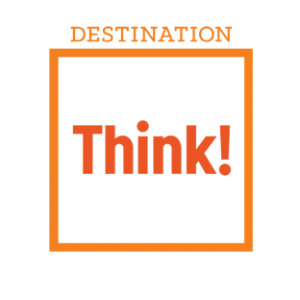» Next Entries
The Archives
-
Internet, social media, Travel & Tourism
First look at Facebook Questions – Lots of potential
07.28.10 | Permalink | 8 Comments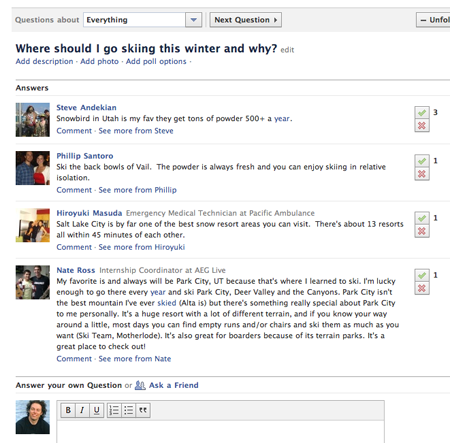
Today Facebook launched Facebook Questions, “a beta product that lets you pose questions like these to the Facebook community. With this new feature, you can get a broader set of answers and learn valuable information from people knowledgeable on a range of topics.”
The new feature is slowly being rolled out. It’s extremely buggy for me at the moment. Searching for questions about specific topics or keywords doesn’t work at all for example.
But the concept is becoming clear.
Facebook is making clever use of the social graph (friend networks) and user profiles. Questions asked by my friends and topics I’ve have listed as interests where listed first for me. You can also send a question to a friend. Inside Facebook as more details about the product and how the social graph is used.

What’s great for fanpage owners is that you ask and answer questions as the fanpage.
For DMO’s and travel operators, monitoring questions and answering them can be a powerful way to built relationships with potential customers. Besides it’s incredible userbase, its use of the social graph and ability for fanpages to participate makes it a great tool for engagement.
-
leadership, Management, Marketing, social media, Travel & Tourism
To be Authentic
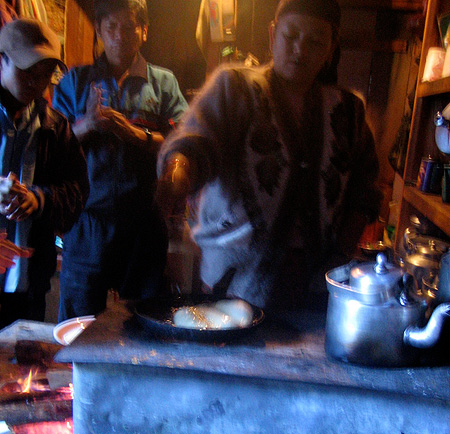
The best meal I ever had wasn’t at a fancy restaurant, made by a celebrity chef, with an award winning wine. It was at a small B&B in Chame, Nepal. Because it was freezing cold we huddled around the kitchen fire where dinner was being made.
The whole family helped out. Kids were preparing veggies, the husband was making the dough for bread and mom was in charge of everything and everybody. Friends and family came and went.
That Dal Bhat was the best meal I’ve ever had. Because it was an authentic experience.
The word authentic keeps popping up lately. Tourists increasingly want authentic experiences. In social media, you need to be authentic to be successful. To be authentic is to be real and genuine.
Simon Sinek, who writes fantastic stuff about leadership by the way, talks about imperfection and authenticity in this blog post.
Perfection comes out of molds or off assembly lines. Things made by nature or by hand are imperfect. It is their flaws that make these objects unlike any other of their kind. It is their imperfections that make these things unique and beautiful.That’s why so much marketing is junk. People try to make it too perfect and as a result, the message isn’t authentic anymore. It’s like most marketing comes from the same assembly line. Killed by process, approvals and egos.
Imperfection is not always a bad thing, when it creates authenticity. Keep this in mind for your business. Don’t mold it like everybody else’s (but don’t use your bathroom as a place for imperfection). Give staff some room to be themselves so they don’t sound like robots and give them the ability to think on their feet and give customers personalized attention.
And in social media, authenticity is a must. Don’t always try to craft the perfect message. Be yourself and try to have meaningful relationships with your network. Just don’t be stupid. And when you make a mistake, apologize.
I’ll finish by quoting Simon one more time.
Great leaders don’t try to be perfect, they try to be themselves. And that’s what makes them great. -
Internet, Marketing, social media, Travel & Tourism
Tripadvisor offers a glimpse into the future
07.12.10 | Permalink | 4 Comments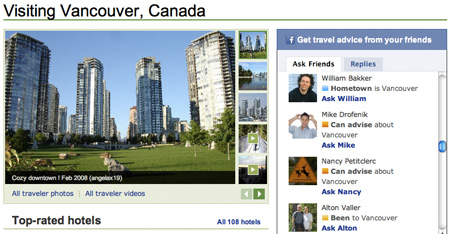
Science fiction writer William Gibson once said “The future is already here – it’s just not evenly distributed.” You can see what some of the future will look like with Tripadvisor’s ‘Trip Friends’.
About 7 years ago we ran some focus groups in San Francisco to learn more about the trip planning process. I remember that involving real people was a very important part of the process. I concluded that people prefer to talk to people in this order:
- People they know and live in the destination they want to visit
- People they know and have been in the destination they want to visit
- People they don’t know and live in the destination they want to visit
- People they don’t know and have been in the destination they want to visit
Tripadvisor is serving up information from group #4 very well; with it’s reviews and message boards. With their ‘destination experts’ on their message boards they also started using group #3.
Now Tripadvisor has also figured out a way to include groups #1 and #2, the most credible sources of information to a trip planner.
A few years ago, Tripadvisor bought the Facebook app “Where I’ve been” for a reported $3M. At the time it was a gimmicky app where you could plot pins on a map for places you’ve visited anywhere in the world. The app was successful because it taps into one key motivator for travel; making my friends and family jealous of the places I’ve been. Tripadvisor also bought it’s 2.3M users. Tripadvisor rebranded it “Cities I’ve visited” and incorporated it into it’s website and has done a decent job of improving it.
Users can add cities they’ve visited, where they want to go, their favourite cities and what cities they can give advise for. The app has an active userbase of 4.8M when I checked today. And I’m sure there are many more users on the Tripadvisor website. As a result, Tripadvisor has an incredible amount of intelligence about their member’s travel history and desires.
Tripadvisor has mashed up with own intelligence with Facebook’s through Facebook Connect and the Open Graph. When you log into Tripadvisor with Facebook connect, and you visit a city page, you’ll now see a list of your friends who:
- live in a particular city
- have a particular city listed as a favourite
- have been to a particular city
- are going to a particular city
Tripadvisor allows you to use Facebooks social networking tools to send a message to one or more of your friends to ask for advise about your upcoming trip based on this information.
Even though it’s a small step, it’s very useful and also a significant indicator of future possibilities for combining your own consumer data (like Tripadvisors data about where people have been) with Facebook’s social graph and social networking power.
“The future is already here – it’s just not evenly distributed.”
Note: I intended to write this post much sooner. But the future is also unevenly distributed by individual and my attempts to login to Tripadvisor with Facebook connect has resulted in error messages for a month now. I’ve reported the error at least a dozen times but I had to resort to using my wife’s Facebook credentials to have a look at this feature.
-
Internet, Management, Marketing, social media, Travel & Tourism
Sheraton Tripadvisor Cards
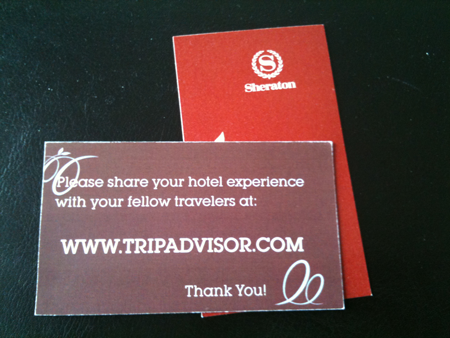
A few weeks ago I spoke about our online marketing activities during the 2010 Olympics in Seattle. I stayed in the Sheraton; great hotel. They left a really nice note in my room, including this card to encourage me to share my experience on Tripadvisor. Simple and effective.
-
Management, Marketing, social media
Passion will win (thank goodness)
In the age of social media; passion wins. Because passion and caring about your customer cannot be faked anymore.
People who are passionate about their customers will deliver better products and experiences. Better products and experiences generates positive word-of-mouth. And in the age of social networks, word-of-mouth is the new branding.
People who are passionate about their profession have the opportunity to create a network of fans in social media. And in the age of social networks, your network of fans is the new resume.
-
Marketing, social media, Travel & Tourism
Something to talk about
06.17.10 | Permalink | 3 Comments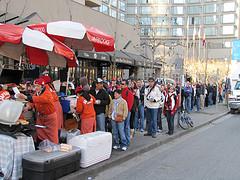
What do travellers talk about after they’ve experienced your tourism business or destination?
In Vancouver, we have many hot-dog vendors. They’re all the same. Some have more condiments than others. That’s pretty much the only difference.
Then this new hot-dog vendor called Japadog popped up. Right in front of our office. Every day, when I leave for lunch, there’s a line-up. The vendor across the street has nobody waiting.
Why? What’s the difference?
Japadog does hot-dogs different. Their menu includes hot-dogs with seaweed, soy, edamame, bonito flakes, fried cabbage and other Japanese goodness.
Everybody’s talking about Japadog. People take pictures and post them on Flickr and Facebook. People talk about it on Twitter. Brag about it on blogs.
What will people talk about when they’ve experienced your business of destination? When an experience is mediocre, there’s nothing to talk about. But with a little creativity, you can give people a reason to talk, tweet and post, giving others a reason to visit.
-
Internet, social media
Social Media and the path to conversion
06.16.10 | Permalink | 2 CommentsI was watching a keynote from Gary Vaynerchuk the other day and in his special style he basically said that people shouldn’t jump to fast to conversion in social media but work on building relationships first and business will follow.
My conclusion:
- Social Media is about relationships
- Relationships build trust
- Trust generates business
Building trust is about integrity, telling the truth, being transparent, helpful, reliable, unselfish and fair. Whether you’re a big brand or a small operator, if you and your staff behave in the ways above, you’ll be one step closer to social media happiness.
-
Management, Marketing, tourism bc
Tourism BC 2010 Online Olympics activities: #12 – Battlestar Olympia
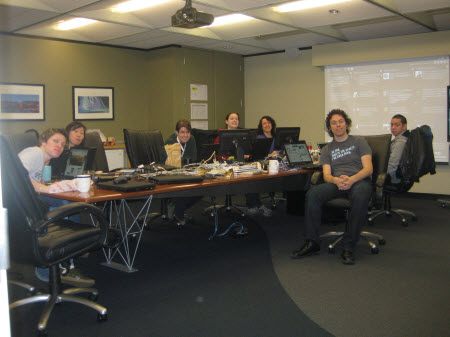
Tourism BC’s online team: Sarah, Jeanine, Holly, Karen, Mikala, William, Jose (on a PPC mission at the time: Dima)The traffic on our websites during the games was significant enough to have a day-to-day look at our tactics and adjust where necesary. What’s media talking about? What are people talking about in social media? Is there a cool story we can leverage through content? Is there something unexpected? Should we send a Field Reporter? Do we make adjustments to our PPC campaigns? Daily huddles and conference calls with our online partners allow us to quickly change plans.
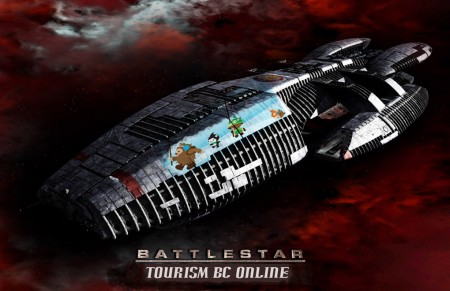
We turned one of our boardrooms into a command centre for the occassion: the Battlestar. Watching the games on a big screen and real time Tweets. Because we’re geeks after all.
This is also my opportunity to thank everybody on the online team, other Tourism BC teams and our partners who were instrumental in making the best use of this Olympic opportunity!
-
Internet, Marketing, tourism bc
Tourism BC 2010 Online Olympics activities: #11 – Social Media
An event like the Olympics makes all media, including social media, light up like a Christmas Tree. Everybody’s talking about it, and that’s exactly what we want. Instead of adding to the noise, our strategy for social media during the games focussed on supporting and encouraging key influencers while leveraging our own network.
Listening
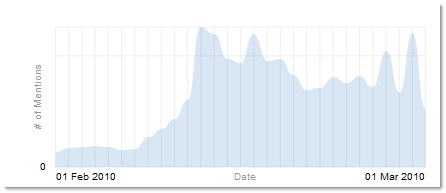
Tourism in BC related social media volume during February
Social media is the largest focus group out there so we treat it as a huge research opportunity. Data has been collected and will be analyzed. We’ve also used our monitoring tools to provide insights to our media, SEM Field Reporters and content teams. This enabled us to quickly respond to unexpected stories.
After the games, we can look at the data to identify what resonated about Vancouver and BC as a destination, potential new markets or product opportunities and key influencers in social media for future engagement.
Assisting and encouraging key influencers
Working with key influencers is a lot like working with travel media professionals (with a twist) especially since many traditional travel media have their own blogs. But there are also pure social media influencers, including local bloggers, athlete tweeters, etc. Jose from our online team has been working closely with our Travel Media team to coordinate efforts.
Building our community

We used the pre-Olympics to experiment with running contests on Twitter. We managed to more than triple our number of followers by giving away some Olympic tickets. We were wondering if people would leave right after, but they didn’t and instead are engaging with Karen, our tweeter extraordinaire, and re-tweeting our messages to their networks.
As an added bonus, our contest winners have been tweeting and blogging about their experiences and traveled around with our Field Reporters.
Engaging our community

Facebook fans and Twitter followers are a diverse group of BC residents, past visitors, tourism industry stakeholders and people who would like to visit. During the games, we tweeted information about the games, general trip ideas based on what was being talked about and re-tweeted messages from others. URLS’s were being tracked and during the games period, drove almost 50,000 visitors to our website.
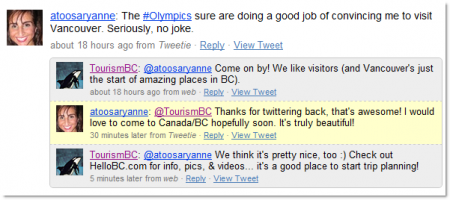
Karen set up searches in Tweetdeck to filter people who expressed an interest in visiting and started the conversation to make the trip a reality leading to wonderful conversations, new followers and hopefully visitors soon.
Lifepoints campaign
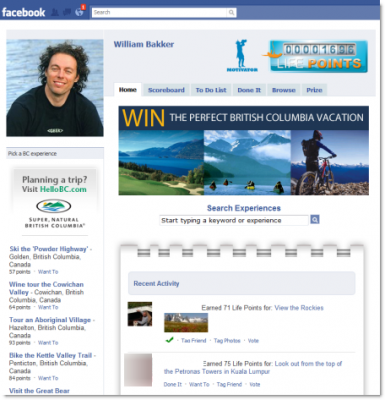
Lifepoints is a Facebook application where you get points for your life experiences. Points are based on how people have rated each experience. Compete with your friends for who gets the most out of life and create your own bucketlist by ‘wanting’ things. A natural fit with tourism so we’re running a campaign with Lifepoints to highlight some of the great experiences British Columbia has to offer and promote our contest.
Field Reporters
And of course we wanted to capture the excitement of the games through our Field Reporters. They’ve been all over town, and the rest of the province, to capture the Olympic vibe, the reactions from spectators, athletes and celebrities, against the backdrop of the destination. -
Marketing, social media, tourism bc, Travel & Tourism, Uncategorized
Tourism BC 2010 Olympics online activities: #2 Torch Relay Field Reporter videos
Paul Clark, Chris Wheeler and me (photo: Geoff Moore)The Torch Relay is a great event to connect people with the games across the country. A perfect vehicle to extend the exposure beyond Vancouver and showcase all of British Columbia around the world.
But like pretty much anything else related to games, access is tough when you’re not a sponsor or accredited media. About a year ago we worked out a partnership with Coca-Cola to cover every day of the Torch Relay in BC, and key cities across Canada through an extended partnership with the Canadian Tourism Commission. That gave us the access we needed.
One of our star Field Reporters Chris Wheeler was up for the challenge and on October 30 last year he started the 106 day journey. With the support from Jose and Mike in our Tourism BC office, and Paul Clark and our regional offices on the road, he created 25 videos in BC and 11 in the rest of Canada. The formula was to use the Torch Relay as a continuing plot-line and highlight specific experiences in the area or community the flame visited that day. You follow the flame, and also see what makes the area great.
The videos are a great success for all partners; awesome stories, tens of thousands of views (almost 300,000 as of Feb 14), great response from the local communities and some great learning for the future. Check out the YouTube channel or our fancy HelloBC Torch Relay page.
» Next Entries

